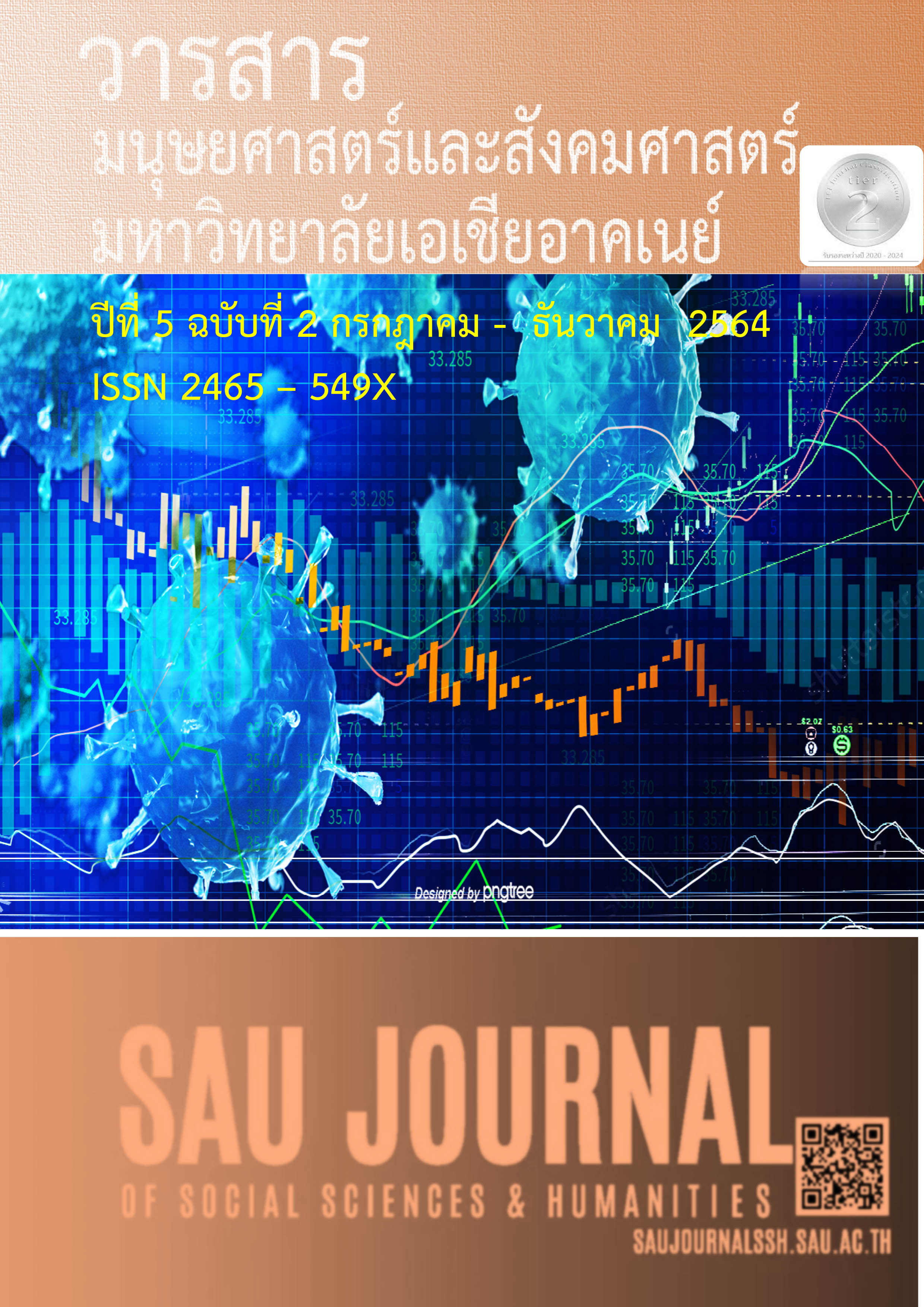การสร้างสมดุลของทุนนิยมโดยรัฐและเศรษฐกิจดิจิตอลในประเทศจีน
คำสำคัญ:
ความสัมพันธ์ระหว่างรัฐ, ตลาด, สาธารณรัฐประชาชนจีน, ทุนนิยมโดยรัฐ, เศรษฐกิจยุคดิจิตอล, การกำกับดูแลไซเบอร์บทคัดย่อ
งานวิจัยนี้มีจุดประสงค์เพื่อศึกษาความสัมพันธ์ระหว่างรัฐ และตลาดของประเทศจีนในยุคเศรษฐกิจดิจิตอลซึ่งได้รับอิทธิพลจากระบบเศรษฐกิจแบบทุนนิยมโดยรัฐซึ่งเริ่มมีการนำมาใช้ตั้งแต่การปฏิรูปเศรษฐกิจในปี 1978 การสร้างสมดุลระหว่างรัฐ และตลาดในยุคที่มีการเน้นการใช้เทคโนโลยี ไอที และสารสนเทศอย่างกว้างขวางเพื่อสนับสนุนการพัฒนาเศรษฐกิจของประเทศจึงเป็นเรื่องที่ท้าทายมากสำหรับรัฐบาลจีนปัจจุบัน งานวิจัยฉบับนี้ใช้วิธีการวิจัยเชิงปริมาณ และเชิงคุณภาพ เพื่อศึกษา และวิเคราะห์ ผลกระทบของการเปลี่ยนแปลงโครงสร้างทางเศรษฐกิจของประเทศจีนต่อความสัมพันธ์ระหว่างรัฐ และตลาดในยุคเศรษฐกิจดิจิตอล ใช้การเก็บรวมรวมข้อมูลจากการวิจัยเอกสารของข้อมูลทุติยภูมิ โดยศึกษาจากแผนยุทธศาสตร์ชาติจีน แผนกลยุทธ์โดยรวมของประเทศ นโยบายด้านดิจิตอลที่สำคัญและโครงสร้างเศรษฐกิจของประเทศจีนในยุคเศรษฐกิจดิจิตอล รวมถึงการวิเคราะห์ความสัมพันธ์ของทุนนิยมโดยรัฐและการกำกับดูแลไซเบอร์ และอภิปรายความสัมพันธ์ระหว่างรัฐ และตลาดของประเทศจีนในยุคเศรษฐกิจดิจิตอล ผลการวิจัยสรุปได้ว่า ความสัมพันธ์ของรัฐและตลาดจะเปลี่ยนแปลงไปตามบริบท และปัจจัยรอบตัวของโครงสร้างเศรษฐกิจประเทศที่เปลี่ยนแปลง โดยรัฐยังเป็นผู้นำในการปรับใช้กลยุทธ์ และนโยบายที่เหมาะสม เพื่อดำรงค์ไว้ซึ่งความมั่นคงของรัฐบาล และพรรคคอมมิวนิสต์จีนในระยะยาว อย่างไรก็ดี ความเหลื่อมล้ำของรายได้ระหว่างภูมิภาคที่เกิดจากการปรับตัวเข้าสู่เศรษฐกิจดิจิตอลยังคงเป็นสิ่งที่รัฐควรให้ความสำคัญในการแก้ไขเป็นลำดับต้นๆ ของประเทศ
เอกสารอ้างอิง
Andrew Scobell, Edmund J. Burke, Cortez A. Cooper III, Sale Lilly, Chad J.R. Ohlandt, Eric Warner, และ J.D. Williams. (2020). China's Grand Strategy: Trend, Trajectories, and Long-Term Competition. Santa Monica, Calif: The RAND Corporation. เรียกใช้เมื่อ 28 05 2021.
Anthony GO Yeh. (2015). Economic transition and urban transformation of China: The interplay of the state and the market. UrbanStudies, 52(15), 2822-2848.
Arthur R. Kroeber. (2016). Overview: China's Political Economy. ใน Arthur R. Kroeber., China’s Economy. What everyone needs to know (หน้า 20). New York: Oxford University Press.
Avery Glodstein. (2020). China's Grand Strategy under Xi Jinping: Reassueance, Reform, and Resistance. International Security, 45(1), 164-201.
CAICT. (2020). Digital Economy Development in China (2020). Beijing: China Academy of Information and Communications Technology (CAICT). เรียกใช้เมื่อ 28 05 2021 จาก http://www.caict.ac.cn/english/research/whitepapers/202007/P020200728343679920779.pdf.
CNNIC. (2011). Statistic Report on Internet Development in China. China Internet Network Information Center. เรียกใช้เมื่อ 17 May 2021 จาก https://www.cnnic.com.cn/IDR/ReportDownloads/201209/P020120904420388544497.pdf
CNNIC. (2021). The 47th Statistical Report on China's Internet Development. China Internet Network Information Center. เรียกใช้เมื่อ 17 May 2021 จาก https://www.cnnic.com.cn/IDR/ReportDownloads/.
David Shambaugh. (2016). Contemplating China's Future. The Washington Quarterly, Fall, 121-130.
Ian Bremmer. (2010). The end of the free market: who wins the war between states and corporations? European View, 9, 249-252.
IIias Alami, Adam D. Dixon, และ Emma Mawdsley. (2021). State Capitalism and the New Global D/development Regime. A Radical Journal of Geography, 0(0), 1-25.
Jonathan Woetzel, Jeongmin Seong, Kavin Wei Wang, James Manyika, Michael Chui, และ Wendy Wong. (August 2017). China's Digital Economy: A leading global force. เข้าถึงได้จาก Mckinsey Global Institution: https://www.mckinsey.com/~/media/mckinsey/featured%20insights/China/Chinas%20digital%20economy%20A%20leading%20global%20force/MGI-Chinas-digital-economy-A-leading-global-force.ashx.
Longmei Zhang, และ Sally Chen. (17 January 2019). IMF Working Papers. เข้าถึงได้จาก International Monetary Fund: https://www.imf.org/en/Publications/WP/Issues/2019/01/17/Chinas-Digital-Economy-Opportunities-and-Risks-46459.
Lynette H. Ong. (2019). Engaging Huangniu (brokers): Commodification of State-Society Bargaining in China. Journal of Contemporary China, 28(116), 293-307.
OECD. (2020). A Roadmap Toward a Common Framework for Measuring the Digital Economy: Report for the G20 Digital Economy Task Force. Saudi Arabia: OECD. เรียกใช้เมื่อ 28 05 2021 จาก https://www.oecd.org/sti/roadmap-toward-a-common-framework-for-measuring-the-digital-economy.pdf.
Pascale Massot. (2020). The state of the study of the market in political economy: China's rise shine light on conceptual shortcomings. Competition & Change, 0(0), 1-27.
Raymond Zhong. (9 April 2021). China Fines Alibaba $2.8 Billion in Landmark Antitrust Case. เข้าถึงได้จาก The New York Times: https://www.nytimes.com/2021/04/09/technology/china-alibaba-monopoly-fine.html.
Rui Hou. (2020). The commercialisation of Internert-opinion management: How the market is engaged in state control in China. new media & society, 22(12), 2238-2256.
Sangkuk Lee. (2017). An Institution Analysis of Xi Jinping's Centralization of Power. Journal of Contemporary China, 26(105), 325-336.
Selim Oterbulbul. (20 02 2021). Rebranding China’s Global Role: Xi Jinping at the World Economic Forum. เรียกใช้เมื่อ 25 05 2021 จาก E-Internaional Relations: https://www.e-ir.info/2021/02/20/rebranding-chinas-global-role-xi-jinping-at-the-world-economic-forum/.
The State Council, PRC. (1 Feb 2016). Internet Plus Adds Vitality to Chinese Economy. เข้าถึงได้จาก The State Council, PRC: http://english.www.gov.cn/policies/infographics/2016/02/01/content_281475282266463.htm.
Weishan Miao, และ Wei Lei. (2016). Policy review: The Cyber space Administration of China. Global Media and Communication, 12(3), 337-340.
Yuji Miura. (2018). China's Digital Economy-Assessing Its Scale, Development Stage, Competitiveness, and Risk Factors. RIM Pacific Business and Industries, XVIII(70), 1-27.
Yukyung Yeo. (2020). The origin of China's distinctive tiered economy. China Information, 34(1), 88-108.






